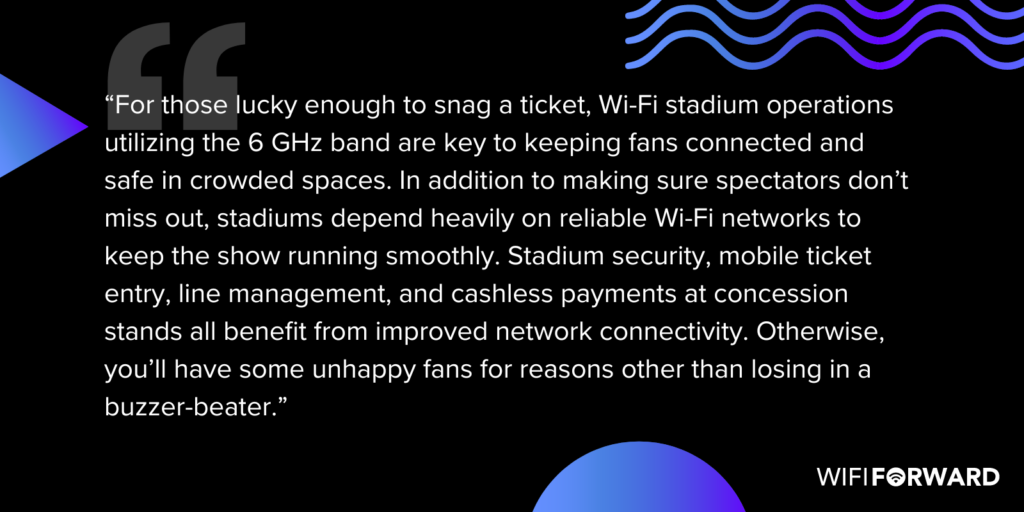The end of March is every college basketball fan’s favorite time of year, with the kickoff of the NCAA Basketball Tournament or March Madness. If you aren’t familiar, the “madness” of it all comes from an action-packed month of over 100 games, with underdogs and upsets of highly favored-to-win teams. With all of the excitement, it’s critical for fans to have a robust communications network whether they are at the stadium or at home – and without Wi-Fi, you might miss the game-winning shot that everyone will be talking about.
If you’re watching from your couch this season, Wi-Fi ensures you can efficiently stream multiple games at once, check the status of your brackets and complain to your fellow basketball fans when your bracket busts. Multiple streaming services and the NCAA’s own application are among the ways you can watch, whether live or just the highlights.
If you’re looking for a different perspective to watch the tournament, other unlicensed technologies like virtual reality (VR) headsets offer an immersive game-day opportunity. The NCAA’s March Madness VR app offers a 180-degree courtside view, bringing you closer to the action and feeling like you’re really at the game, even from your own couch.
For those lucky enough to snag a ticket, Wi-Fi stadium operations utilizing the 6 GHz band are key to keeping fans connected and safe in crowded spaces. In addition to making sure spectators don’t miss out, stadiums depend heavily on reliable Wi-Fi networks to keep the show running smoothly. Stadium security, mobile ticket entry, line management, and cashless payments at concession stands all benefit from improved network connectivity. Otherwise, you’ll have some unhappy fans for reasons other than losing in a buzzer-beater.

But don’t just take our word for it – collegiate and professional athletic programs nationwide are upgrading their facilities to meet their networks’ growing demands. For example, the University of Tennessee recently announced a massive project to install a very high density (VHD) Wi-Fi network at the historic Neyland Stadium. Several venues for the men’s and women’s tournaments also boast powerful Wi-Fi network capabilities, including the University of Dayton, TD Garden, as well as State Farm Stadium and Rocket Mortgage Fieldhouse, which will notably host the Final Four games of both tournaments.
With record attendance expected at the women’s games to watch rising stars, like the University of Iowa’s Caitlin Clark, we don’t doubt that Wi-Fi will be there to ensure fans can tune in to watch this historic post-season unfold. Modernizing the game-day experience will continue to rely on improving wireless connectivity in our homes and at venues so that fans can enjoy a seamless event without disruption – from stadium entry to the last shot. Even if your bracket gets busted this tournament, rest assured that your Wi-Fi won’t be, and we can all benefit from this powerful technology to meet our connectivity needs.
